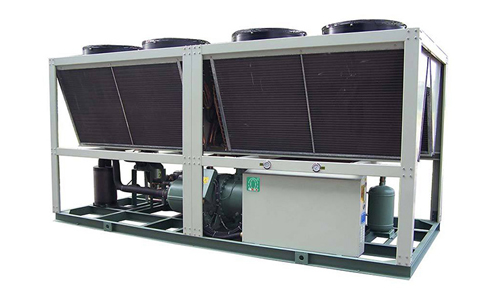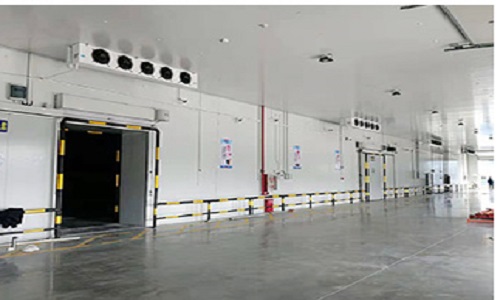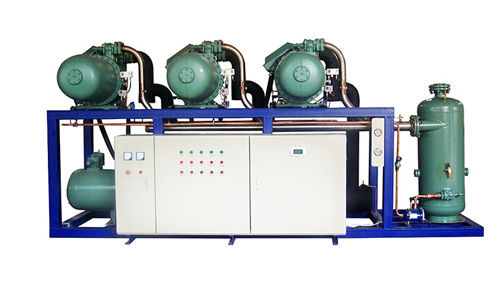Choosing the right air-cooled chiller is crucial for ensuring optimal performance and energy efficiency in various applications, from industrial processes to HVAC systems. In this guide, we will explore the key factors to consider when selecting an air-cooled chiller, answer common questions, and provide practical tips for making an informed decision.
Understanding Air-Cooled Chillers
Air-cooled chillers are refrigeration systems that use air to dissipate heat from the refrigerant. Unlike water-cooled chillers, they do not require a cooling tower, making them easier to install and maintain. These chillers are ideal for applications where water resources are limited or where water usage needs to be minimized.
Key Factors to Consider
When selecting an air-cooled chiller, consider the following factors to ensure you choose the right unit for your needs:

Air-cooled Screw Chillers
1. Cooling Capacity: Determine the cooling capacity required for your application. This is typically measured in tons or kilowatts (kW). Consider the total heat load and any future expansion needs to ensure the chiller can handle the required cooling load.
2. Efficiency: Look for chillers with high energy efficiency ratings. Efficiency is often indicated by the Coefficient of Performance (COP) or the Energy Efficiency Ratio (EER). Higher COP or EER values indicate more efficient chillers, leading to lower operating costs.
3. Ambient Temperature: Consider the ambient temperature conditions where the chiller will be installed. Air-cooled chillers need to dissipate heat into the surrounding air, so their performance can be affected by high ambient temperatures. Ensure the chiller is rated for the maximum ambient temperature it will encounter.
4. Noise Levels: Evaluate the noise levels of the chiller, especially if it will be installed in or near occupied spaces. Look for models with noise reduction features or sound enclosures to minimize disruption.
5. Footprint and Space Requirements: Assess the available space for the chiller installation. Air-cooled chillers come in various sizes, so ensure the unit fits within the designated area and allows for proper airflow and maintenance access.
6. Reliability and Maintenance: Choose a chiller from a reputable manufacturer known for reliability and durability. Consider the ease of maintenance and availability of spare parts to ensure the chiller operates smoothly over its lifespan.
7. Environmental Impact: Look for chillers that use environmentally friendly refrigerants with low Global Warming Potential (GWP) and Ozone Depletion Potential (ODP). This helps minimize the environmental impact and ensures compliance with regulations.
Common Questions about Selecting Air-Cooled Chillers
Q: What is the difference between air-cooled and water-cooled chillers?
A: Air-cooled chillers use air to dissipate heat from the refrigerant, while water-cooled chillers use water and a cooling tower. Air-cooled chillers are easier to install and maintain, but may be less efficient in high ambient temperatures. Water-cooled chillers are more efficient but require a reliable water source and additional infrastructure.
Q: How do I determine the right cooling capacity for my application?
A: Calculate the total heat load of your application, considering factors such as equipment heat output, ambient temperature, and any additional heat sources. Consulting with an HVAC engineer or chiller manufacturer can help ensure accurate sizing.
Q: Are there specific regulations or standards to consider when selecting a chiller?
A: Yes, ensure the chiller complies with relevant regulations and standards, such as energy efficiency standards, refrigerant regulations, and safety certifications. This ensures legal compliance and optimal performance.
Q: Can I use an air-cooled chiller for both industrial and commercial applications?
A: Yes, air-cooled chillers are versatile and can be used in various applications, including industrial processes, commercial HVAC systems, data centers, and medical facilities. Choose a chiller that meets the specific requirements of your application.
Q: How can I improve the efficiency of my air-cooled chiller?
A: Regular maintenance, such as cleaning the coils and filters, ensuring proper airflow, and checking refrigerant levels, can improve efficiency. Additionally, optimizing the chiller's operation schedule and upgrading to high-efficiency models can further enhance performance.
By considering these factors and addressing common questions, you can select an air-cooled chiller that meets your needs, ensures reliable performance, and provides energy-efficient cooling for your application.







